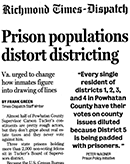Virginia bill would help counties avoid prison-based gerrymandering
HB13 will give any county faced with drawing a district that would be more than 12% incarcerated the option of choosing to not include the prison populations when drawing the districts.
by Peter Wagner, December 21, 2011
A bill that will give more counties in Virginia the option to avoid prison-based gerrymandering has been reintroduced in the House. It passed unanimously last session only to die in a Senate committee.
Historically, Virginia law required counties to base their legislative districts on federal Census data, denying Virginia counties the flexibility exercised by counties in other states to choose the population basis of their required redistricting. The Census Bureau counts people in prison – who by state law can’t vote and are not considered residents of the prison – as residents of the prison location. When used for rural county redistricting, this data can give extra influence to the people who live next to a large prison, and dilute the votes of residents in other districts in the same county.
In 2001, Virginia amended the law, giving counties where incarcerated people make up more than 12% of the Census population the option to avoid padding the Board of Supervisors district that contains the prison with the prison population.
Unfortunately, the 2001 law did not give all counties relief from state-mandated prison-based gerrymandering. For example, Southampton County’s prison population was too small to benefit from the 2001 law, yet the county was still forced to draw a district that was more than half incarcerated. This gave the residents of the district with the prison more than twice the political influence of the residents of other districts in the county.
The bill, HB13, has been pre-filed by Delegate Riley Ingram (R-Chesterfield, Henrico, Prince George, City of Hopewell) and will give any county faced with drawing a district that would be more than 12% incarcerated the option of choosing to not include the prison populations when drawing the districts. The change in the bill is subtle, but it will more than double the number of rural counties eligible to keep prison populations from distorting their districts.
Ideally, the Census Bureau or the state would count incarcerated people at their home addresses for state and local redistricting purposes. Prison and election-reform advocates are urging the Census Bureau to count incarcerated people at home in the next Census, and four states (California, Delaware, Maryland and New York) have passed legislation that applies to state legislative redistricting. But HB13 is an important step in the right direction towards ending prison-based gerrymandering in Virginia.
For more information:
- Unanimous resolution of the Board of Supervisors of Prince George County, Virginia, calling on the state to amend the state law that requires the county to use prison populations when redistricting to detriment of county democracy, November 23, 2010
 Legislature urged to change prisoners’ role in districting, by Frank Green, Richmond Times-Dispatch, September 5, 2010
Legislature urged to change prisoners’ role in districting, by Frank Green, Richmond Times-Dispatch, September 5, 2010- Culpeper supervisors begin redistricting work in county, by Donnie Johnston, Free Lance-Star (Fredericksburg), February 16, 2011
- Supervisors name redistricting panel, by Michael Copley, Powhatan Today, February 23, 2011
- Taking a closer look at the redistricting process, by Carson Tucker (Powhatan County Supervisor, District 5), Powhatan Today, February 23, 2011
- Prison-based gerrymandering’s impact at the local level in Virginia (from our Fixing prison-based gerrymandering after the 2010 Census report)
- Primer for reporters on county or municipal redistricting & prison-based gerrymandering, by Peter Wagner, March 2011
 Legislature urged to change prisoners’ role in districting
Legislature urged to change prisoners’ role in districting



[…] the bill passes, the law would be expanded to apply to federal and regional correctional facilities, not just state prisons. It would also let […]
[…] more information about the bill, check out our recent blog posts Virginia bill would help counties avoid prison-based gerrymandering, and Virginia counties may be given more choices in avoiding prison-based gerrymandering. Related […]